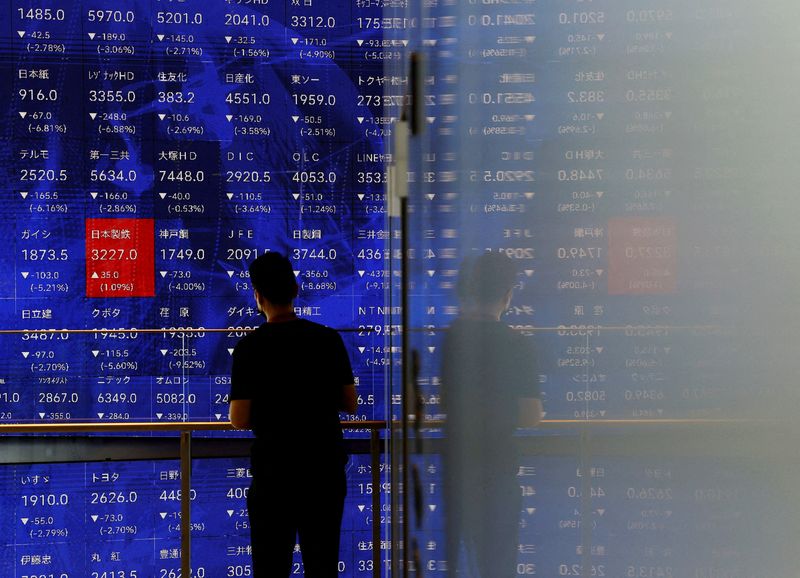By Summer time Zhen
HONG KONG (Reuters) – World traders are turning bearish on once-favoured Japanese shares following final week’s turbulence as they reassess financial prospects and the viability of yen-funded trades.
Utilizing low cost yen to purchase shares on the Nikkei was a scorching commerce till this month. The Nikkei index had doubled for the reason that begin of 2023, and a tumbling yen had boosted returns for traders and corporations.
That commerce is being turned on its head by sudden volatility within the Japanese yen, Financial institution of Japan (BOJ) charge rises, doubts round Japan Inc.’s earnings and worries the U.S. financial system is stalling.
The CSOP Each day Double Inverse exchange-traded fund – the one ETF outdoors Japan that enables bearish bets in opposition to the Nikkei index – noticed a surge in its buying and selling quantity through the week ended Aug. 9.
Common every day turnover on the Hong Kong-listed product reached almost HK$20 million ($2.57 million), a 20-fold improve from earlier week’s roughly HK$1 million per day and the best since its launch in Might this 12 months.
Traders are additionally exiting direct publicity to Japan.
World hedge funds dumped Japanese equities on the quickest tempo in additional than 5 years through the Aug. 2 to Aug. 8 week, Goldman Sachs mentioned, and even some long-term traders have began chopping publicity.
The BOJ’s quantitative tightening and a robust yen shall be headwinds for Japanese shares, mentioned Ben Bennett, head of funding technique for Asia at LGIM, a London-based asset administration big.
The agency’s multi-asset funds had turned underweight Japanese equities earlier than final week, he mentioned, including they maintained that weighting after the risky week.
Japanese shares had their worst one-day sell-off since 1987 final Monday. Fears of a U.S. recession and a shock charge hike in Japan triggered an enormous unwinding of billions of {dollars} of a well-liked yen carry commerce that was financing the acquisition of danger belongings, together with Japanese equities.
Whereas the precise dimension of the unwinding stays unsure, some analysts warn it has room to go, given expectations of yen appreciation and a spike within the .
The yen has surged from round 162 per greenback in mid-July to roughly 142 per greenback final Monday, its strongest degree in seven months.
“One of the drivers of upside in Japanese equities is going to phase out,” mentioned Carlos Casanova, senior economist for Asia at Swiss asset supervisor UBP, referring to yen carry trades.
“Now we need to see an improvement in fundamentals, meaning that you need to see upward revisions in earnings. And that’s not going to happen unless we see a recovery in the domestic economy,” he mentioned.
UBP has just lately exited some positions in Japanese equities and now holds a impartial view.
Zuhair Khan, Tokyo-based senior portfolio supervisor at UBP, mentioned it was getting more durable to commerce the Japanese market because the U.S. rate of interest lower path and the yen had each turn out to be tougher to foretell.
Markets, in the meantime, are ready for knowledge due this week on Japanese second-quarter financial development and U.S. inflation.

“No one wants to act rashly now,” mentioned Steven Leung, a Hong Kong-based govt director at UOB-Kay Hian. “Investors need to wait for important figures this week to draw a more informed conclusion about whether the sell-off in Japanese stocks is over.”
($1 = 7.7882 Hong Kong {dollars})




